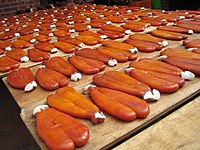Karasumi
| Karasumi | |
|---|---|

Taiwanese mullet roe drying in open air. The roe is deveined, and progressively pressed, dehydrated and salted until the desired firmness or texture is achieved. Mullet roe is considered a delicacy in Taiwan as well as in Japan.
|
|
| Japanese name | |
| Kanji | 唐墨, 鱲子 |
| Katakana | カラスミ |
| Rōmaji | karasumi |
| Chinese name | |
| Traditional Chinese | 烏魚子 |
| Hanyu Pinyin | wūyúzi |
| Hokkien POJ | o͘-hî-chí |
Karasumi is a food product made by salting mullet roe and drying it by the sunlight. A theory suggests that it got its name from its resemblance to the blocks of sumi (inkstick) imported from China (Kara) for use in Japanese calligraphy. Karasumi is a high priced delicacy and it is eaten while drinking sake. It is a softer analog of Mediterranean Bottarga.
It is a speciality of Nagasaki and along with salt-pickled sea urchin roe and Konowata one of the "three chinmi of Japan". The town of Donggang in Taiwan specializes in the delicacy. Mullet fishing in Taiwan can be traced back to when the island was under Dutch colonial rule.
...
Wikipedia
